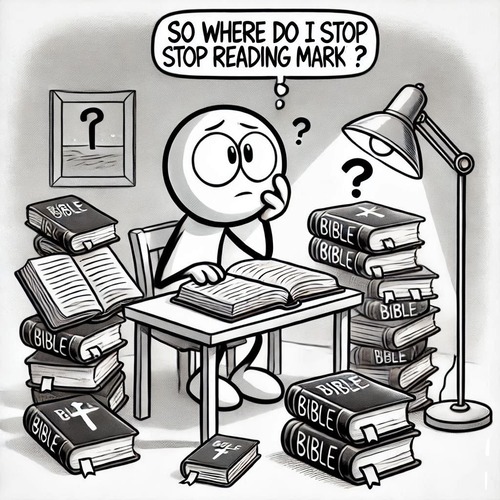Verbal Plenary Inspiration: Why We Affirm Every Word of Scripture
Why do Reformed Christians seem so committed to the precise words of Scripture? Why do we pour over Bible texts with such care and attention to detail? At the heart of this commitment lies the doctrine of Verbal Plenary Inspiration.
How is this doctrine the bedrock upon which our understanding of God’s revelation stands? Why does it shape how we read, understand, and apply God’s Word in our lives?
WHAT IS VERBAL PLENARY INSPIRATION?
Verbal Plenary Inspiration is the doctrine that affirms the Holy Spirit’s work in guiding the human authors of Scripture so that the very words they wrote were exactly the words God intended. Let’s break this down:
- Verbal refers to the actual words of Scripture—not just the ideas or concepts, but the specific words themselves. This doesn’t mean mechanical dictation (as if the biblical writers were merely taking divine dictation), but rather that God worked through the personalities, vocabularies, and styles of the human authors to communicate precisely what He intended.
- Plenary means “full” or “complete,” indicating this inspiration extends to all parts of Scripture—every book, chapter, and verse. Nothing in the Bible is “more inspired” than other parts; all of it carries divine authority.
- Inspiration comes from the Greek term theopneustos (literally “God-breathed”) found in 2 Timothy 3:16. The metaphor of divine breath conveys the idea that Scripture originates from God Himself, carrying His life and authority.
This view differs significantly from other perspectives on Scripture, such as:
- Partial inspiration (only some parts are inspired)
- Conceptual inspiration (only the ideas are inspired, not the words)
- Natural inspiration (the Bible is inspired only in the sense that great literature is “inspired”)
- Neo-orthodox views (the Bible “becomes” the Word of God in encounter)
The Reformed position has consistently maintained Scripture is fully God’s Word in its entirety and in its very words.
BIBLICAL SUPPORT FOR VERBAL PLENARY INSPIRATION
The doctrine of Verbal Plenary Inspiration isn’t imposed on Scripture from outside—it arises from what the Bible claims about itself. Consider these key passages:
- 2 Timothy 3:16-17: This foundational text explicitly states Scripture is “God-breathed” (theopneustos). Note it’s “all Scripture”—not just parts—and that this divine origin makes it authoritative and sufficient for the Christian life.
- 2 Peter 1:20-21: Here, Peter describes the process of inspiration. The biblical authors were “carried along” by the Holy Spirit, indicating divine guidance while preserving human agency.
- Matthew 5:18: Jesus Himself affirmed the inspiration and authority of Scripture down to its smallest details (the “iota” is the smallest letter in the Hebrew alphabet, and a “dot” refers to the smallest stroke in a Hebrew letter).
- John 10:35: “…and Scripture cannot be broken…” In this brief statement, Jesus establishes the inviolable authority of God’s written Word. It “cannot be broken”—its truth and authority stand firm.
- 1 Corinthians 2:13: Paul here claims divine inspiration for the very words used in apostolic teaching, not merely for the concepts.
These passages, among others, present a consistent picture of Scripture as fully inspired by God, authoritative in all its parts, and trustworthy in all its words.
THE REFORMED UNDERSTANDING
The doctrine of Verbal Plenary Inspiration has been a hallmark of Reformed theology since the Reformation itself. It’s intimately connected with the principle of sola scriptura (Scripture alone), which affirms the Bible as our highest authority in matters of faith and practice.
The major Reformed confessions clearly articulate this view:
- The Westminster Confession of Faith (1646) states: “The authority of the Holy Scripture, for which it ought to be believed, and obeyed, dependeth not upon the testimony of any man, or church; but wholly upon God (who is truth itself) the author thereof: and therefore it is to be received, because it is the Word of God.”
- The Belgic Confession (1561) affirms: “We receive all these books, and these only, as holy and canonical, for the regulation, foundation, and confirmation of our faith; believing without any doubt all things contained in them, not so much because the Church receives and approves them as such, but more especially because the Holy Spirit witnesses in our hearts that they are from God.”
John Calvin, the foremost theologian of the Reformed tradition, consistently upheld the full inspiration and authority of Scripture. He wrote: “The Law and the Prophets are not a doctrine delivered according to the will and pleasure of men, but dictated by the Holy Spirit… We owe to the Scripture the same reverence which we owe to God; because it has proceeded from Him alone, and has nothing belonging to man mixed with it.”
This high view of Scripture has been consistently maintained by Reformed theologians throughout church history, from Calvin and the early Reformers to BB Warfield, J Gresham Machen, and contemporary Reformed scholars.
CONCLUSION: VERBAL PLENARY INSPIRATION
In a world of shifting opinions and subjective truth claims, the doctrine of Verbal Plenary Inspiration stands as a beacon of certainty and hope. It reminds us God hasn’t left us to grope in darkness but has spoken clearly, authoritatively, and sufficiently in His Word.
For the Reformed believer, this doctrine isn’t merely academic—it’s devotional. It calls us to approach Scripture with reverence, to study it with diligence, and to obey it with joy, knowing that in its pages, we hear the very voice of our covenant God.
As we read, study, and meditate on Scripture, may we do so with renewed appreciation for God’s gracious self-revelation, confident that every word is “God-breathed” and “profitable” for our growth in grace. And may our commitment to the inspiration and authority of Scripture lead us to its author, the triune God who speaks that we might know Him.
VERBAL PLENARY INSPIRATION: COMMON OBJECTIONS ADDRESSED
What about translation issues? While inspiration applies specifically to the original texts (the autographs), God has providentially preserved His Word through faithful transmission and translation. Good translations accurately convey the meaning of the inspired original. The differences between reliable translations are minimal and don’t affect any major doctrine.
- What about apparent contradictions? Upon careful examination, apparent contradictions in Scripture can be reconciled through proper interpretation that considers context, genre, purpose, and the principle that Scripture interprets Scripture. The Reformed tradition has always recognised the need for careful exegesis while maintaining the Bible’s perfect harmony of truth.
- What about human authors’ personalities and styles? Verbal inspiration doesn’t negate human authorship. God worked through the distinct personalities, vocabularies, and writing styles of the biblical authors. This is often called “organic inspiration”—God used human instruments without overriding their individuality, yet ensured that what they wrote was exactly what He intended.
Doesn’t verbal plenary inspiration amount to bibliolatry? No, affirming Verbal Plenary Inspiration isn’t worshiping the Bible; it’s recognising God has chosen to reveal Himself through His written Word. We don’t worship the Bible; we worship the God who speaks in and through the Bible. High regard for Scripture actually magnifies God, not the book itself.
- Doesn’t science contradict the Bible in many places? When properly understood, Scripture and science are not in conflict. Apparent contradictions often stem from interpretive misunderstandings, either of scientific data or biblical texts. Scripture’s purpose is primarily theological rather than scientific, yet what it affirms about the natural world, when properly interpreted, will never contradict genuine scientific discoveries.
- How can we trust the Bible when it was compiled by fallible church councils? The church councils didn’t create the canon of Scripture; they recognised what God’s people had already received as authoritative. The Holy Spirit guided this process in accordance with God’s promise to lead His people into truth. The coherence, impact, and supernatural preservation of the biblical canon testify to God’s providential oversight in its formation.
Doesn’t Verbal Plenary Inspiration lead to fundamentalism and narrow-mindedness? Properly understood, this doctrine should produce humility, not arrogance, as we submit to God’s revealed truth rather than our own opinions. Careful exegesis of the inspired text actually prevents narrow proof-texting by demanding that we engage with the full counsel of God. The most faithful students of Scripture throughout church history have demonstrated profound wisdom, nuance, and compassion—not rigid fundamentalism.
VERBAL PLENARY INSPIRATION: OUR RELATED POSTS
Editor's Pick

‘Out of Egypt I Called My Son’: Did Matthew Misuse Hosea 11:1?
When Matthew quotes Hosea 11:1 in his Gospel—“Out of Egypt I called my son”—he draws a connection that has puzzled [...]

Bible Allusions: How They Enrich Our Grasp of God’s Word
Ever experienced that moment when you're reading Scripture and suddenly recognise an echo of another passage? That spark of recognition [...]

Old Testament Theophanies: What Purposes Did They Serve?
Throughout the Old Testament, we encounter remarkable moments when God manifests Himself in visible, often tangible forms to His people. [...]

When Words Fail: How the Holy Spirit Helps Us in Our Prayers
Ever sat down to pray and found yourself at a complete loss for words? Or perhaps you’ve prayed diligently but [...]

Isaiah 64:6: How Are Our Righteous Deeds Like Filthy Rags?
“We have all become like one who is unclean, and all our righteous deeds are like a polluted garment.” — [...]

The Greatest Yet the Least: How Is John the Baptist Both?
In Matthew 11:11, Jesus makes a statement that has puzzled Bible readers: “Truly I tell you, among those born of [...]

The Pilgrim’s Progress: Journeying Through the Psalms of Ascent
The Psalms of Ascent (Psalms 120-134) are a remarkable collection of fifteen songs that have guided God's people for millennia. [...]

Not Home Yet: How Scripture’s Exile Theme Shapes Our Faith
When we read Scripture carefully, a striking pattern emerges: God’s people are almost always on the move, displaced, or living [...]

At Pentecost: God Fulfils Covenant and Reverses Babel
The scene is electrifying. Jerusalem, crowded with Jewish pilgrims from across the known world. A sound like rushing wind fills [...]

The Sun’s Age: Is It Really A Showstopper for A Young Earth?
When discussing creation and the age of the earth, sceptics often point to the sun as definitive evidence against the [...]
SUPPORT US:
Feel the Holy Spirit's gentle nudge to partner with us?
Donate Online:
Account Name: TRUTHS TO DIE FOR FOUNDATION
Account Number: 10243565459
Bank IFSC: IDFB0043391
Bank Name: IDFC FIRST BANK






